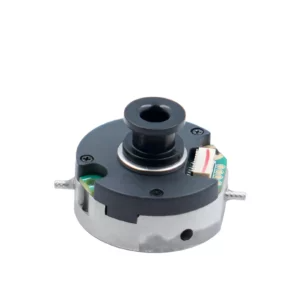


The Role of Multi-Turn Absolute Rotary Encoders in Precision Engineering
Precision engineering demands highly accurate motion control systems, especially in industries where efficiency and reliability are critical. Multi-turn absolute rotary encoders play a pivotal role in ensuring precise position tracking over multiple rotations, making them indispensable in fields such as robotics, construction machinery, and automated production lines.
Unlike single-turn encoders, which reset position data after one full rotation, multi-turn encoders retain absolute position information across multiple revolutions. This capability is significant for applications that require extended motion control without position loss.
A multi-turn absolute rotary encoder is a sensor that not only detects angular position but also keeps track of the number of complete revolutions. These encoders provide absolute position feedback, meaning they retain position data even after power loss. This feature sets them apart from incremental encoder modules, which only track changes in position but require a reference point to determine absolute positioning.
By using optical, magnetic, or capacitive sensing methods, multi-turn encoders ensure high-resolution feedback that enhances motion control accuracy. Their ability to measure both rotational angle and total rotations makes them ideal for automation systems where maintaining continuous, error-free operation is crucial.
Multi-turn absolute rotary encoders provide continuous position feedback across multiple rotations, ensuring precision in robotic arms, CNC machines, and automated systems. This eliminates the need for position resets, maintaining seamless operation.
By retaining position data after power interruptions, multi-turn encoders prevent downtime and ensure uninterrupted workflow in automation and production lines.
By combining single-turn and multi-turn data, these encoders enhance motion-tracking accuracy, making them crucial for servo control systems and high-speed applications.
In manufacturing and printing, multi-turn encoders enable smooth, recalibration-free operations, boosting productivity and reducing manual intervention.
Ideal for robotics, construction machinery, and automated production, they offer precise tracking across multiple axes, ensuring synchronised movement in dynamic environments.
With rugged designs resistant to dust, moisture, and vibrations, multi-turn encoders maintain reliable performance in demanding industrial settings.
The latest advancements in multi-turn absolute rotary encoder technology include improved sensing mechanisms, battery-free designs, and compact form factors for easy integration. Optical and magnetic sensing technologies are being refined to enhance resolution, while newer encoders feature energy-harvesting systems that eliminate the need for backup batteries.
Additionally, some encoders now incorporate innovative connectivity features, allowing seamless integration with industrial IoT (IIoT) systems. These innovations enhance data monitoring capabilities, providing real-time performance insights for predictive maintenance and efficiency optimisation.
As industries push for greater automation and efficiency, multi-turn absolute rotary encoders will remain a cornerstone of precision engineering. Their ability to provide real-time, high-resolution position tracking ensures that machines operate with maximum accuracy and minimal downtime.
From robotics to high-speed production lines, these encoders continue to redefine motion control by offering reliability, flexibility, and seamless integration into modern industrial applications.
